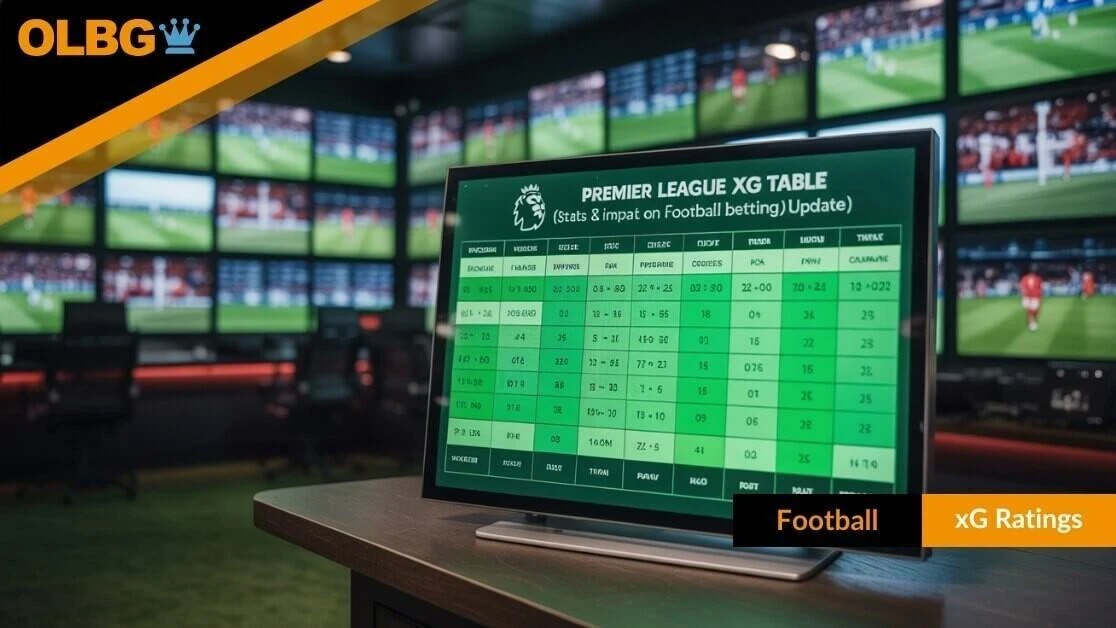
With hundreds of different betting sites, finding the best can be confusing. I'll guide you through and find the most suitable bookie for you.
While the concept of statistics within football has primarily been a popular one when looking for predictions to place at betting sites, there has been a data explosion in recent years and if any action takes place on the field of play, you can be sure it will be captured as some form of metric.
Metrics that have changed the way to digest and discuss football, and arguably the most significant change in recent times, has been the rise of Expected Goals or xG as it is perhaps better known by those in the game.
What is xG in Football?
Expected goals (or xG) measure the quality of an opportunity of a goal by calculating the likelihood that it will be scored from a particular position on the pitch during a particular phase of play. xG in football is a statistic demonstrating what might or should happen rather than what has happened
This new Expected Goals measure divides fandom into those who believe the new method and those who consider themselves sceptics.
For those that do not believe in the power of xG, their argument is based upon the lack of genuine facts. “How can you score 1.45 goals?” is a line often parroted by the naysayers looking for football betting tips, as they fail to look into football’s statistical future.
While for those who do buy into the new age of performance metric models, have the ability to shape a different argument on how an individual player or team is performing and this argument comes in the form of a comparative benchmark.

THE BIG QUESTION
Of course, for those who only have a passing interest in football or perhaps have been blinkered by the concept of Expected Goals in the past, it may make sense to enlighten everyone, and the best way to do that is by explaining what the concept is.
Expected Goals can be explained as such:
Expected goals (or xG) measure the quality of a chance by calculating the likelihood that it will be scored from a particular position on the pitch during a particular phase of play
To explain further; If a team scored 61 goals in a season but their xG was 64.51, it would indicate a slight underperformance in terms of the chances that were created and some shots that would have been expected to hit the back of the net, failed to do so.
While in comparison to that, if a team scored 61 goals in a season but their xG was 57.32 for the campaign, this would indicate an overperformance in front of goal and chances that were considered trickier in nature, were ones that still got the better of the opposition.
Now that we have an idea of what the metric actually means and how it can be used as a benchmark for performance, we can now apply this to the final current Premier League table of 2024/25 and see how teams shaped up in front of goal.
First here is a simplified version of the current Premier League table, with an additional metric of xG and the difference between actual Goals For and their xG for the season so far:
| Rk | Squad | Pts | GF | xG | Goals - xG |
|---|---|---|---|---|---|
| 1 | Liverpool | 84 | 86 | 82.2 | 3.8 |
| 2 | Arsenal | 74 | 69 | 59.9 | 9.1 |
| 3 | Manchester City | 71 | 72 | 68.1 | 3.9 |
| 4 | Chelsea | 69 | 64 | 67.8 | -3.8 |
| 5 | Newcastle Utd | 66 | 68 | 63.8 | 4.2 |
| 6 | Aston Villa | 66 | 58 | 56.1 | 1.9 |
| 7 | Nott'ham Forest | 65 | 58 | 45.5 | 12.5 |
| 8 | Brighton | 61 | 66 | 58.7 | 7.3 |
| 9 | Bournemouth | 56 | 58 | 64 | -6 |
| 10 | Brentford | 56 | 66 | 59 | 7 |
| 11 | Fulham | 54 | 54 | 49 | 5 |
| 12 | Crystal Palace | 53 | 51 | 60.4 | -9.4 |
| 13 | Everton | 48 | 42 | 41.8 | 0.2 |
| 14 | West Ham | 43 | 46 | 47 | -1 |
| 15 | Manchester Utd | 42 | 44 | 52.6 | -8.6 |
| 16 | Wolves | 42 | 54 | 43.7 | 10.3 |
| 17 | Tottenham | 38 | 64 | 58.8 | 5.2 |
| 18 | Leicester City | 25 | 33 | 32.6 | 0.4 |
| 19 | Ipswich Town | 22 | 36 | 34.4 | 1.6 |
| 20 | Southampton | 12 | 26 | 32.7 | -6.7 |
As you can see, the top three teams in the Premier League table have all outperformed their xG and for those at the higher end of the league ladder, such a finding is not to be unexpected if only because they are no slouches in front of goal with their scoring chances.
While of those teams in the bottom six, two of those are currently underperforming in front of goal when using the measure of expectation. Southampton who were cast adrift at the bottom of the table and Manchester United who had a season to forget.
That aside, if we assume a hypothesis that teams at the top of the table will overperform in front of goal and teams at the bottom will do the opposite, the data gives a fair indication that this is correct.

WHERE IS THE CONTEXT
Like so many other statistical conversations, the table below is nothing without context and while using the existing data above, we are now going to add a rank column – one that allows us to get a better idea of the true over and underachievers.
| Squad | GF | Pts | xG | Goals - xG | Goals-xG Rank |
|---|---|---|---|---|---|
| Nott'ham Forest | 58 | 65 | 45.5 | 12.5 | 1 |
| Wolves | 54 | 42 | 43.7 | 10.3 | 2 |
| Arsenal | 69 | 74 | 59.9 | 9.1 | 3 |
| Brighton | 66 | 61 | 58.7 | 7.3 | 4 |
| Brentford | 66 | 56 | 59 | 7 | 5 |
| Tottenham | 64 | 38 | 58.8 | 5.2 | 6 |
| Fulham | 54 | 54 | 49 | 5 | 7 |
| Newcastle Utd | 68 | 66 | 63.8 | 4.2 | 8 |
| Manchester City | 72 | 71 | 68.1 | 3.9 | 9 |
| Liverpool | 86 | 84 | 82.2 | 3.8 | 10 |
| Aston Villa | 58 | 66 | 56.1 | 1.9 | 11 |
| Ipswich Town | 36 | 22 | 34.4 | 1.6 | 12 |
| Leicester City | 33 | 25 | 32.6 | 0.4 | 13 |
| Everton | 42 | 48 | 41.8 | 0.2 | 14 |
| West Ham | 46 | 43 | 47 | -1 | 15 |
| Chelsea | 64 | 69 | 67.8 | -3.8 | 16 |
| Bournemouth | 58 | 56 | 64 | -6 | 17 |
| Southampton | 26 | 12 | 32.7 | -6.7 | 18 |
| Manchester Utd | 44 | 42 | 52.6 | -8.6 | 19 |
| Crystal Palace | 51 | 53 | 60.4 | -9.4 | 20 |
Although Liverpool recorded a positive xG their figure was not the largest of the lot. That accolade was earned by Nottingham Forest with a positive difference of 12.5. Nuno Espirito Santo's men scored 58 goals, their expectation was 45.5.
2.2 expected goals better off than that of Wolves in second. The Molinuex men one of only two sides to record a positive xG difference of more than 10. They scored 54 league goals last season, they were only expected to score 43.7.
That 10.3 was enough to edge out Arsenal into third as last season's runners up recorded a positive xG of 9.1, a total of 3.9 better off than their North London rivals Tottenham in sixth.
In between those two outfits and recording highly positive xG differences are Brighton and Brentford, fourth and fifth in this chart at 7.3 and 7.0 above respectively.
At the other end of the table it does not make good reading if you are a Southampton supporter. Then again, the sam can be said if your allegiance is with Manchester United.
The Saints recorded a negative xG difference of 6.7 last season as they toiled at the foot of the table but United's negative difference was even worse.
The Red Devils were hardly demonic in front of goal. A negative difference of 8.6 caused quite the headache for manaager Ruben Amorim. Then again, £200m worth of new attacking talent should see those symptoms ease.
However, the biggest disparity came at Selhust Park as Crystal Palace recorded the largest difference between goals scored and xG.
Oliver Glasner's men may have won the FA Cup last season but they toiled in terms of league form. 51 goals scored but the expectation was a total of 60.4, meaning a negative difference of 9.4 goals for the Eagles.
TIME TO PROVE OR DISPROVE
| Rk | Squad | Goals - xG Rank | Position vs Goals-xG Rank) |
|---|---|---|---|
| 1 | Liverpool | 10 | -9 |
| 2 | Arsenal | 3 | -1 |
| 3 | Manchester City | 9 | -6 |
| 4 | Chelsea | 16 | -12 |
| 5 | Newcastle Utd | 8 | -3 |
| 6 | Aston Villa | 11 | -5 |
| 7 | Nott'ham Forest | 1 | 6 |
| 8 | Brighton | 4 | 4 |
| 9 | Bournemouth | 17 | -8 |
| 10 | Brentford | 5 | 5 |
| 11 | Fulham | 7 | 4 |
| 12 | Crystal Palace | 20 | -8 |
| 13 | Everton | 14 | -1 |
| 14 | West Ham | 15 | -1 |
| 15 | Manchester Utd | 19 | -4 |
| 16 | Wolves | 2 | 14 |
| 17 | Tottenham | 6 | 11 |
| 18 | Leicester City | 13 | 5 |
| 19 | Ipswich Town | 12 | 7 |
| 20 | Southampton | 18 | 2 |
As we know from the first two tables, Liverpool finished top of the Premier League and Nottingham Forest top of the xG but what happens when we compare the two ranks together?
As you can see Liverpool are nine places worse off when measuring their xG performance to their league position and by comparison, Forest are actually six places better off.
Arsenal have to make do with being one position worse off for their troubles, but at least it is not the six place difference that Manchester City have to deal with.
One thing to remember when comparing two ranks is that the sum total of all the results will always come back to zero. No matter the positives and negatives, they always balance back out in the end.
This means another way to look at the above table is to list them in terms of difference against the two and see just where the wildest or narrowest swings are and when we shuffle it around, it looks as follows:
| Rk | Squad | Goals - xG Rank | Position vs Goals-xG Rank) |
|---|---|---|---|
| 16 | Wolves | 2 | 14 |
| 17 | Tottenham | 6 | 11 |
| 19 | Ipswich Town | 12 | 7 |
| 7 | Nott'ham Forest | 1 | 6 |
| 10 | Brentford | 5 | 5 |
| 18 | Leicester City | 13 | 5 |
| 8 | Brighton | 4 | 4 |
| 11 | Fulham | 7 | 4 |
| 20 | Southampton | 18 | 2 |
| 2 | Arsenal | 3 | -1 |
| 13 | Everton | 14 | -1 |
| 14 | West Ham | 15 | -1 |
| 5 | Newcastle Utd | 8 | -3 |
| 15 | Manchester Utd | 19 | -4 |
| 6 | Aston Villa | 11 | -5 |
| 3 | Manchester City | 9 | -6 |
| 9 | Bournemouth | 17 | -8 |
| 12 | Crystal Palace | 20 | -8 |
| 1 | Liverpool | 10 | -9 |
| 4 | Chelsea | 16 | -12 |
The most striking thing that you will notice here is that Chelsea have the biggest negative difference when comparing the two metrics together,. Fourth in the Premier League but only 16th when looking at their xG value compared to goals - 12 places worse off.
Then again, things do not read all that much better for Liverpool. The Reds may be league champions but their minus nine comparitive ranking places them second bottom of this particular table.
At the top end there are reasons for both Wolves and Tottenham to be cheeful. The Molineux men are 14 places better off, their North London counterparts 11.
While although Ipswich were relegated at the end of the season, their 19th place finish was compared to 12th in the xG ranking - a positive improvement of seven.
CONCLUSION
Although xG should not necessarily be considered as gospel, it is a measure that is getting more and more understood with each season that passes and although some will still point to the fact that you cannot win matches with decimal points, you arguably need them to win league titles.
Because there is always a feeling that your xG will get you in the end, although a club may get lucky during one single encounter and somehow outperform their efforts in front of goal, they cannot outrun such a measure over 38 matches.
Outperform your xG and you will be much closer to league honours or at least an invite to Europe next season. Fail to get the better of the expectation and the relegation trapdoor may soon be ready to collect you.
Source: Data correct as of AUGUST 14TH 2025 taken from FBRef.com
So let's now dive deeper and take a look at some more information on xG in the Premier league
The Expected Goals Premier League 2024/25
Some readers of this article will have embraced the concept, some readers have tried but still do not understand and others simply bury their heads in the sand when it comes to one of football’s newest statistics.
A measure of not what did happen but what should have and with the expected value of shots now acting as a method to analyse how teams are performing truly, we will use Expected Goals or xG as it is better known to build a league table of our own.

Expected Goals (xG) Betting Explained
While the way to do this, is by going back in time slightly and to build the best possible picture, we are going to look at each of the 380 Premier League matches that took place during the 2024/25 Premier League season.
Each of these matches will have seen a final score logged in the history books and in addition, it would have also seen an xG figure added alongside it. For example, lets take a look at the first evening of last season, as Manchester United played host to Fulham.
The Red Devils picked up maximum points at Old Trafford in the traditional sense after a narrow 1-0 win and also within the framework of our xG league. Because to get a win in our creation, the team with the highest xG figure must be at least 0.5 clear to pick up three points.
Why 0.5? Because rounded up that is equal to 1 and this is the difference required to win a football match. If the two xG scores are within 0.5 of each other it constitutes a draw and if one team is more than 0.5 lower than their opposition, it means they go home empty-handed.
A QUICK REMINDER
Now that we have offered up the methodology of how our Premier League xG points are awarded, it makes sense to remind you of how the 2024/25 season finished:
| Position | Squad | MP | W | D | L | GF | GA | GD | Pts |
|---|---|---|---|---|---|---|---|---|---|
| 1 | Liverpool | 38 | 25 | 9 | 4 | 86 | 41 | 45 | 84 |
| 2 | Arsenal | 38 | 20 | 14 | 4 | 69 | 34 | 35 | 74 |
| 3 | Manchester City | 38 | 21 | 8 | 9 | 72 | 44 | 28 | 71 |
| 4 | Chelsea | 38 | 20 | 9 | 9 | 64 | 43 | 21 | 69 |
| 5 | Newcastle Utd | 38 | 20 | 6 | 12 | 68 | 47 | 21 | 66 |
| 6 | Aston Villa | 38 | 19 | 9 | 10 | 58 | 51 | 7 | 66 |
| 7 | Nott'ham Forest | 38 | 19 | 8 | 11 | 58 | 46 | 12 | 65 |
| 8 | Brighton | 38 | 16 | 13 | 9 | 66 | 59 | 7 | 61 |
| 9 | Bournemouth | 38 | 15 | 11 | 12 | 58 | 46 | 12 | 56 |
| 10 | Brentford | 38 | 16 | 8 | 14 | 66 | 57 | 9 | 56 |
| 11 | Fulham | 38 | 15 | 9 | 14 | 54 | 54 | 0 | 54 |
| 12 | Crystal Palace | 38 | 13 | 14 | 11 | 51 | 51 | 0 | 53 |
| 13 | Everton | 38 | 11 | 15 | 12 | 42 | 44 | -2 | 48 |
| 14 | West Ham | 38 | 11 | 10 | 17 | 46 | 62 | -16 | 43 |
| 15 | Manchester Utd | 38 | 11 | 9 | 18 | 44 | 54 | -10 | 42 |
| 16 | Wolves | 38 | 12 | 6 | 20 | 54 | 69 | -15 | 42 |
| 17 | Tottenham | 38 | 11 | 5 | 22 | 64 | 65 | -1 | 38 |
| 18 | Leicester City | 38 | 6 | 7 | 25 | 33 | 80 | -47 | 25 |
| 19 | Ipswich Town | 38 | 4 | 10 | 24 | 36 | 82 | -46 | 22 |
| 20 | Southampton | 38 | 2 | 6 | 30 | 26 | 86 | -60 | 12 |
For those football fans who were living under a rock, Liverpool beat Arsenal to the title by ten points. Manchester City had to make do with third and the trio of Leicester, Ipswich and Southampton were relegated.
Now we will present the xG table using our methodology and see who our Expected Goals Premier League champions are:
| Position | Team | P | W | D | L | GF | GA | GD | PTS |
|---|---|---|---|---|---|---|---|---|---|
| 1 | Liverpool | 38 | 20 | 11 | 1 | 82.1 | 38.5 | 43.6 | 89 |
| 2 | Arsenal | 38 | 19 | 14 | 4 | 60 | 34.1 | 25.9 | 74 |
| 3 | Bournemouth | 38 | 13 | 9 | 8 | 63.8 | 48.7 | 15.1 | 72 |
| 4 | Newcastle Utd | 38 | 17 | 8 | 10 | 63.9 | 45.4 | 18.5 | 68 |
| 5 | Manchester City | 38 | 19 | 17 | 5 | 67.9 | 47.9 | 20 | 65 |
| 6 | Chelsea | 38 | 13 | 18 | 6 | 67.8 | 47.3 | 20.5 | 60 |
| 7 | Aston Villa | 38 | 18 | 15 | 8 | 56 | 50 | 6 | 60 |
| 8 | Crystal Palace | 38 | 10 | 16 | 8 | 60.4 | 49.2 | 11.2 | 58 |
| 9 | Fulham | 38 | 10 | 13 | 11 | 49.1 | 47.2 | 1.9 | 55 |
| 10 | Brighton | 38 | 18 | 17 | 9 | 58.5 | 54.5 | 4 | 53 |
| 11 | Manchester Utd | 38 | 13 | 14 | 12 | 52.5 | 53.8 | -1.3 | 50 |
| 12 | Brentford | 38 | 10 | 15 | 12 | 59 | 55.5 | 3.5 | 48 |
| 13 | Nott'ham Forest | 38 | 7 | 11 | 15 | 45.3 | 49 | -3.7 | 47 |
| 14 | Tottenham | 38 | 13 | 13 | 14 | 58.7 | 63.3 | -4.6 | 46 |
| 15 | Everton | 38 | 5 | 19 | 13 | 42 | 46.3 | -4.3 | 37 |
| 16 | Wolves | 38 | 4 | 20 | 13 | 43.6 | 57.8 | -14.2 | 35 |
| 17 | West Ham | 38 | 6 | 20 | 14 | 47.2 | 59.5 | -12.3 | 32 |
| 18 | Ipswich Town | 38 | 2 | 10 | 24 | 34.3 | 72.4 | -38.1 | 22 |
| 19 | Leicester City | 38 | 8 | 10 | 25 | 32.7 | 71.9 | -39.2 | 19 |
| 20 | Southampton | 38 | 4 | 4 | 31 | 32.5 | 85 | -52.5 | 13 |
As life imitates art, Liverpool not only beat Arsenal once again, but they also widen the margin of victory by a considerable distance. Whereas it was five points before, the gap at the top has now been extended to 15.
Manchester City who finished third in the traditional sense has to make do with a fifth place finish instead as they ended up on 65 points, three more than Newcastle in fourth.
However, it is Bournemouth that are the real success story in all of this. Although their European bid may have run out of puff at the end of the season, there were no such issues if the league table was decided on xG.
The Cherries under manager Andoni Iraola would have recorded 72 points under our measurement, just two less than Arsenal in second. A suggestion that better fortunes in front of goal could have earned them continental football.
Then again, continental football at the highest level was afforded to Chelsea after their performances under Enzo Maresca. The Blues finished fourth in the Premier League table, sixth in ours pipping Aston Villa to seventh on goal difference.
While Crystal Palace capped their memorable season with a eighth place in the xG league, finishing above Fulham and Brighton who both helped round out the top ten.
At the bottom of the table, it is as you were in terms of relegation candidates. Ipswich and Leicester swapping places in the xG ladder but still earning nowhere near enough points to keep their heads above water. As for Southampton, they only picked up 13 points all season when using our xG measurement.
While West Ham must be told to do better next time around, they could only record a 17th place finish when looking at xG but there was never going to be any concerns regarding relegation when you consider that they were 10 points clear of the drop.
WINNERS AND LOSERS
While a better way to compare and contrast is by seeing the points differences from one table to another and here, we will be able to get a much greater view of which teams profited via the method of xG and who were worse off.
| Final Position | xG Position | Final -xG | Team | W | D | L | PTS |
|---|---|---|---|---|---|---|---|
| 9 | 3 | 6 | Bournemouth | -2 | -2 | -4 | 16 |
| 17 | 14 | 3 | Tottenham | 2 | 8 | -8 | 8 |
| 15 | 11 | 4 | Manchester Utd | 2 | 5 | -6 | 8 |
| 12 | 8 | 4 | Crystal Palace | -3 | 2 | -3 | 5 |
| 1 | 1 | 0 | Liverpool | -5 | 2 | -3 | 5 |
| 5 | 4 | 1 | Newcastle Utd | -3 | 2 | -2 | 2 |
| 20 | 20 | 0 | Southampton | 2 | -2 | 1 | 1 |
| 11 | 9 | 2 | Fulham | -5 | 4 | -3 | 1 |
| 19 | 18 | 1 | Ipswich Town | -2 | 0 | 0 | 0 |
| 2 | 2 | 0 | Arsenal | -1 | 0 | 0 | 0 |
| 18 | 19 | -1 | Leicester City | 2 | 3 | 0 | -6 |
| 6 | 7 | -1 | Aston Villa | -1 | 6 | -2 | -6 |
| 3 | 5 | -2 | Manchester City | -2 | 9 | -4 | -6 |
| 16 | 16 | 0 | Wolves | -8 | 14 | -7 | -7 |
| 10 | 12 | -2 | Brentford | -6 | 7 | -2 | -8 |
| 8 | 10 | -2 | Brighton | 2 | 4 | 0 | -8 |
| 4 | 6 | -2 | Chelsea | -7 | 9 | -3 | -9 |
| 14 | 17 | -3 | West Ham | -5 | 10 | -3 | -11 |
| 13 | 15 | -2 | Everton | -6 | 4 | 1 | -11 |
| 7 | 13 | -6 | Nott'ham Forest | -12 | 3 | 4 | -18 |
Bournemouth are the big winners when comparing the two league tables. Not only are they six positions better off, but they also have an additional 16 points to go in their bank account.
Andoni Iraola's men would have lost four fewer matches than they did and also two fewer draws - their 16 point profit was twice as much as Tottenham and Manchester United who find themselves joint second.
This gives Tottenham something else to celebrate after also winning last season's Europa League but as we all know, it was not enough to save Ange Postecoglou from the sack.
As for Liverpool, they are one of two teams who found themselves five points better off. The other being Crystal Palace and the pair share joint fourth when it comes to positive points swings being collected.
Nottingham Forest on the other hand will be far more keen to use the official Premier League table rather than our version as the City Ground finished 18 points worse off.
Seventh in the table securing European football, xG would have only rewarded them with a 13th place finish by comparison. Nuno Espirito Santo's men would have recorded 12 fewer league wins if measured by expected goals.
Forest bottom when measuring the points difference, not a great story for West Ham or Everton either as they find themselves 11 points worse off.
Two more points than Chelsea's disparity. Enzo Maresca's men would have been seven defeats worse off and picked up nine additional draws. No chance of Champions League football with that string of results!
CONCLUSION
Now that we know how to use xG to award league points, there is nothing stopping us from doing the same during the 2025/26 season. Will on-pitch performance match the expectation of goals? Only time will tell.
Data correct as of 14th August 2025.
Source Fbref.com



